From Visual Analytics for Business Intelligence
Jump to navigation
Jump to search
Participant Distribution
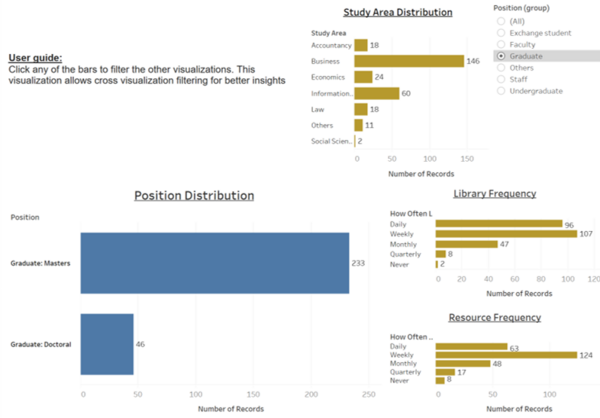
| Insights
|
Recommendations
|
- For post-graduates, most of the participants were from business school, went to the library weekly and used library resources weekly.
- The number of participants for the library survey dwindles as Undergraduate seniority increases. This is probably due to absence from school to fulfill internship and exchange requirements
|
|
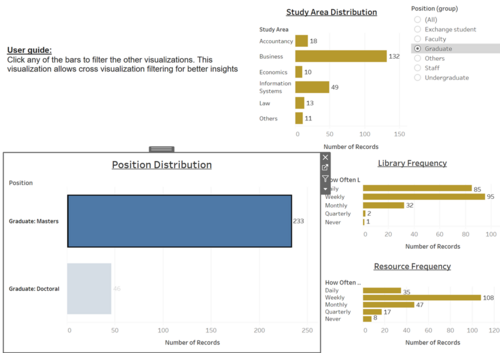
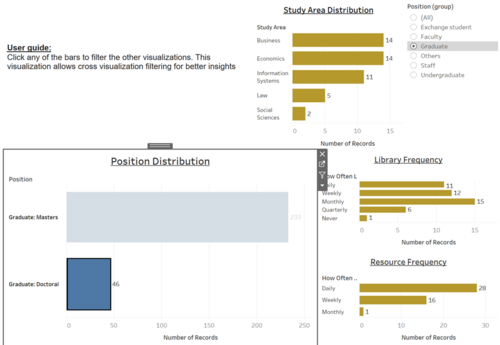
| Insights
|
Recommendations
|
- For Graduates: Masters, most of the participants were from business school, went to the library weekly and used library resources weekly.
- For Graduates: Doctoral, participants had a more uniform distribution across study areas, with the exception of 0 from the Accounting study area. Doctoral students were also less likely to frequent the library with majority only visiting on a monthly basis. However, the use of resources were on a daily basis. This could be attributed to the sufficiency of online resources for the doctoral students.
|
- Library might want to think of ways of engaging Accounting doctoral students. Possibly by having accounting related events in the library.
- Library could focus on targeting post-graduates through online means and providing a strong online library database.
|
Stated Preference vs Revealed Preference
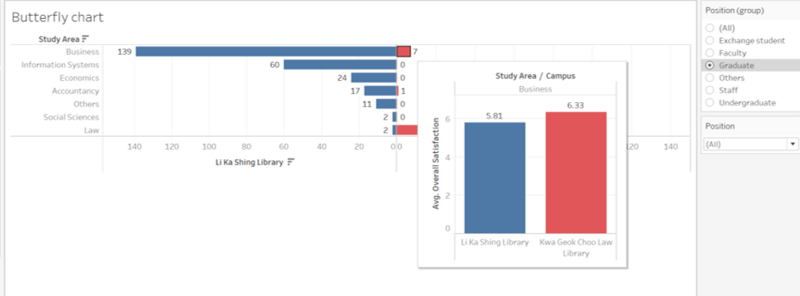
| Insights
|
Recommendations
|
- The Butterfly chart allows us to see the preferences the different faculties have for each library. As can be seen from the chart, with the exception of Law, all faculties had a strong preference for the Li Ka Shing Library. However, when we look at the overall satisfaction of students, business school students rated the KGC library much higher but frequented the LKS library more.
- This could be possibly due to the fact that when this survey was conducted in 2018, the Kwa Geok Choo Law Library was a relatively new library and most students would experience resistance to change. Another factor would be distancing. The KGC Law Library is relatively far from the rest of the faculties.
- In 2018, there was lack of a sheltered walkway to the law school and also a lack of food options, both problems have since been addressed.
- Another reason could be naming of the library. The inclusion of the word “Law” in the Library name might create an impression of exclusiveness.
|
- Most of the problems have been addressed since 2018, however, there is still room for improvement in the F&B region.
- Possibly remove the word “Law” from the library name.
|
Importance
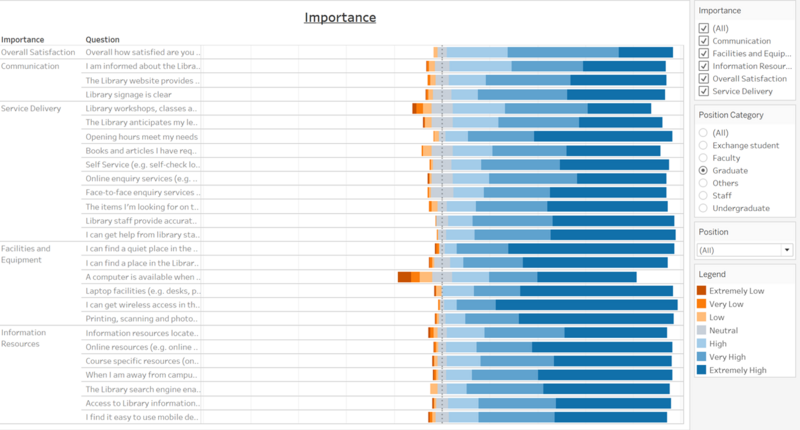
| Insights
|
Recommendations
|
- The likert scale for importance shows the importance of the library services. I have placed the participants overall satisfaction as a benchmark for the metrics. The library should focus efforts on solving problems with high importance yet low performance.
- As compared to undergraduates, post-graduates seem to be more satisfied with all the services and generally gave a higher rating score for importance.
- It is interesting to note that overall satisfaction and did not look consequent of the satisfaction from the metrics. This could mean that there are other variables or metrics not included in the survey which contributed to the participant’s satisfaction.
- The 3 metrics that the participants highlighted to be the most important were the questions “I can get wireless access in the Library when I need to”,"Printing scanning and photocopying facilities in the Library meet my needs" and "I can find a quiet place in the Library when I need to". Of these 3, only "I can get wireless access in the Library when I need to" is met with the desired performance. There is some catching up to do for the next 2 metrics.
|
- Improve printing facilities in the Library.
- Enforce the keeping of silence in the library.
- Find out what other metrics that could possibly contribute to overall satisfaction to include in the survey.
|
Performance
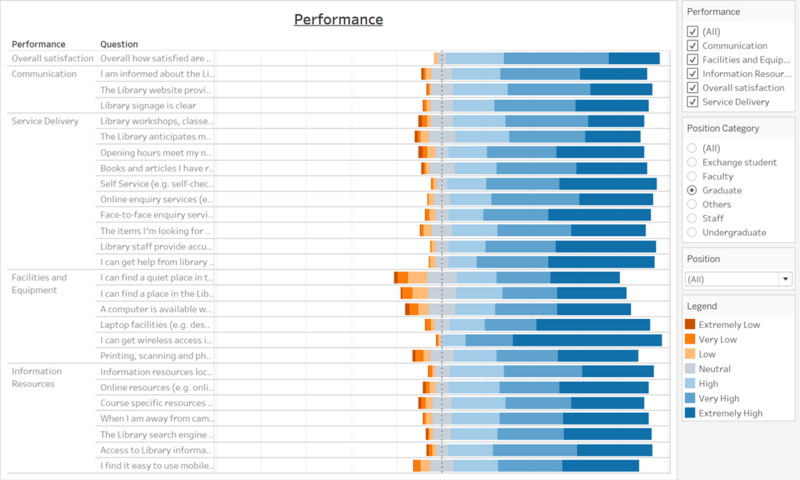
| Insights
|
Recommendations
|
- The likert scale for performance shows the performance of the library services. I have placed the participants overall satisfaction as a benchmark for the metrics. The library should focus efforts on solving problems with low performance yet high importance.
- As compared to undergraduates, post-graduates seem to be more satisfied with all the services and generally gave a higher rating score for importance.
- The 3 metrics that did the poorest for performance were for the questions "I can find a quiet place to study in the library if I need to", “I can find a place in the Library to work in a group when I need to” and "I find it easy to use mobile devices (e.g. tablets and phones) to access online resources" Participants have voted these metrics in high importance but are met with low performance. It is interesting to note that post-graduates seem to be more sensitive to the performance of "studying alone" while undergraduates were more sensitive to the performance of "studying in groups".
- Another metric that did poorly for performance was the metric on “A computer is available when I need one. However, this metric was rated as low importance. Comparing performance with importance, this metric did relatively well. It is good that the library does not waste its resources on metrics that the users do not find important.
|
- Create more co-working spaces in the library for students to do group activities.
- Enforce the keeping of silence in the library.
- Improve user interface for online resources for mobile devices.
|
Referral
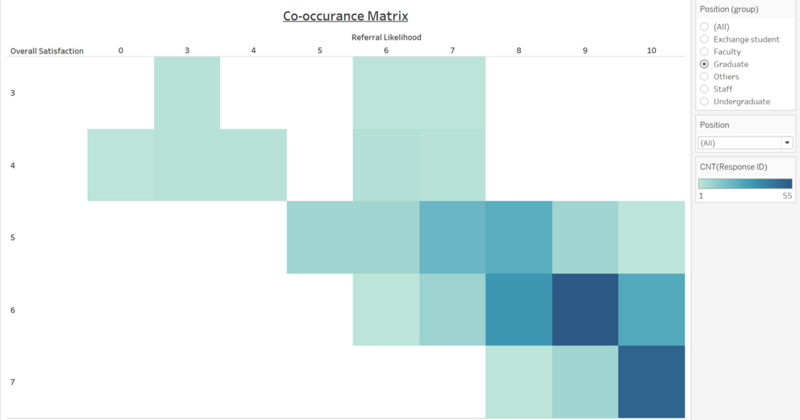
| Insights
|
Recommendations
|
- It can be seen from the co-occurrence matrix that likelihood of referral has a correlation with overall satisfaction. Majority of the participants had a score of 6 for satisfaction and rated the likelihood of referral as a 9. This is better as compared to the undergraduates who were likely to give likelihood of referral as an 8. Those who had an overall satisfaction of 7 were most likely to vote a 10 for likelihood to refer a friend.
|
- Library might want to introduce referral programs where the referral can gain reward for referring a friend. This could both introduce new visitors to the library and increase the satisfaction of the existing library goers.
|
Word Cloud (Positive)
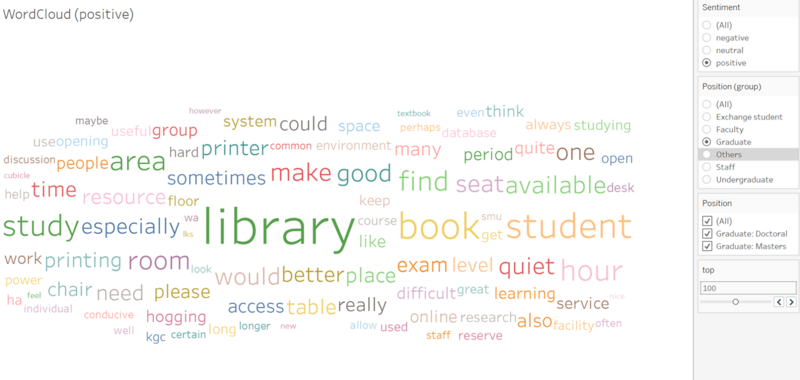
| Insights
|
Recommendations
|
- There is positive sentiment on words such as book, quiet, student, room. This is important feedback and shows that most people who are satisfied with the library have these words in common in their comments. From this we can infer that there are good reading resources and a quiet studying environment.
|
- Library should filter comments by these keywords to gain better insights as to what the comments are about.
|
Word Cloud (Negative)
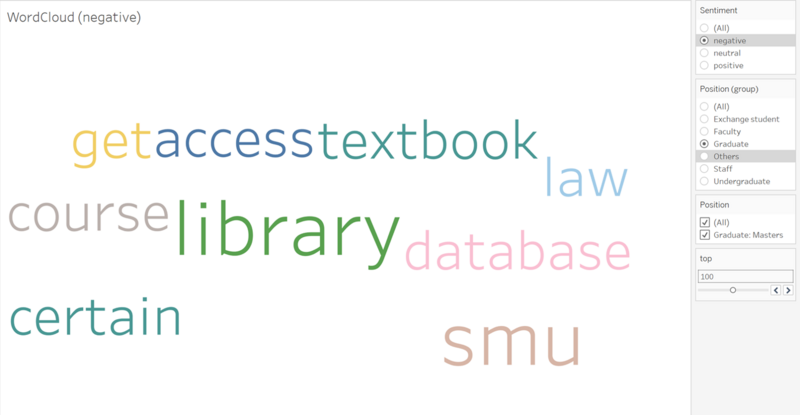
| Insights
|
Recommendations
|
- There seems to be a lack of contribution for negative comments, the visualization shows that there is no doctoral students who wrote negative comments and only masters students.
- There seems to be negative sentiment for words such as access, library and database. This is important feedback and shows that post-graduates who are dissatisfied with the library are likely to be dissatisfied with the online library resources. This coincides with our earlier finding that post-graduates utilize online resources more often than visiting the library.
|
- Library should look into the access of data in the library database.
|








